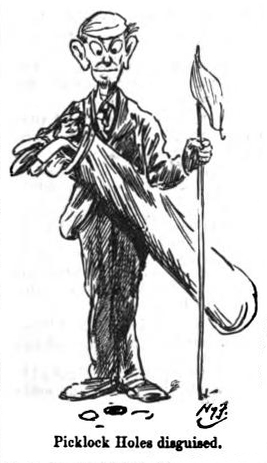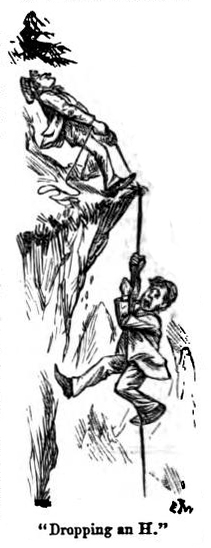Picklock's Disappearance
| << No. 7 : The Stolen March | The Adventures of Picklock Holes | No. 1 : Picky Back No. I >> |
Picklock's Disappearance is the 8th story of the first series of Sherlock Holmes parodies: The Adventures of Picklock Holes written by R. C. Lehmann (aka Cunnin Toil) starring Picklock Holes as the detective and Potson as his sidekick. First published on 13 january 1894 in Punch magazine. 2 illustrations by E. J. Wheeler.
Picklock's Disappearance


Illustration by E. J. Wheeler

Illustration by E. J. Wheeler
Never in the course of a long and varied experience have I taken up my pen with a heavier heart than that which now beats mournfully within my breast. It has been my enviable lot to follow my hero, my wonderful friend, my arch-prince of detectives through many a strange and startling adventure. While he with his matchless acumen has been engaged in checking the ambitious designs of foreign despots, in unveiling to the startled gaze of statesmen the criminal plots of secret societies, in foiling coalitions, in unravelling the tangled skeins of murder-conspiracies, in bringing dark deeds of crime relentlessly home to ducal perpetrators, in restoring jewels to bereaved countesses, in convicting baronets of burglary, and generally in putting local constabularies in every part of the civilised world to shame; while he, I say, has been engaged in these and similar undertakings I have been ever at his side, the faithful foil, the admiring companion, the irremovable fly on the wheel of his world-renowned exploits. And now that fate has taken him from me I scarce know whither I am to turn. Surely never again shall I meet in this world so wise, so cold, so impassive, so friendly a sleuth-hound of detection; never again shall I behold another upon whom my candid flow of irrepressible wonder will pour itself with so small an effect.
"Potson," he would often say to me when I had congratulated him in my impulsive way upon some master-stroke of cunning strategy; "Potson, you are not absolutely clever, but, personally, I do not care for very clever men. They are always wanting to outwit one. The task of course is hopeless, but to counteract it one has to waste valuable time. But you have about you a comfortable non-cleverness, always delightfully ready to burst into admiration whenever I give you an opportunity. Potson, I like you."
"Holes," I replied, overcome by emotion, "you are an extraordinary fellow. I would willingly follow you to the ends of the world."
I remember this little conversation all the more distinctly because, taking place as it did in an unfrequented thoroughfare of the Bloomsbury district, Holes was immediately afterwards able to infer from a large stain of milk upon the pavement in front of one of the houses that a bald and fraudulent solicitor was at that moment lying in a fit on the floor of the dining-room. This was how he proved it:
"Milk," he said, "has been spilt here. To spill milk is a blunder which is often worse than, and, therefore, at least equal to, a crime. We have therefore got the certainty of a crime. A solicitor has to deal with crimes. We thus get the fact that we have here a solicitor who has committed a crime. Now fraud is a crime. Therefore, substituting fraud for crime we obtain a solicitor who has committed fraud. I said a moment back that this solicitor was not only fraud but baldulent—"
"Pardon me," I ventured to interrupt, "pardon me, my dear Holes, you mean bald and fraudulent."
"Of course," he retorted, without moving a muscle; "I said so, bald and fraudulent. Now mark how beautifully it works out. A detected criminal is invariably angry. This man has been detected by me. To be angry is merely another way of saying that one has lost his hair. He is, therefore, proved beyond possibility of doubt to be bald. With regard to the fit, the process of induction is no less delicate and convincing. A solicitor wears clothes which fit him, whether well or badly matters not. He has, therefore, a fit. Have I proved my case? "
"Holes, I said, "you are a wonderful fellow."
We informed the neighbouring policeman, but I cannot now remember if matters proceeded to a conviction. The incident, however, remains in my mind as one of the most remarkable proofs of my friend's almost superhuman powers.
And now, as I said, I have lost him, and must proceed as best I can to give some account of his disappearance. We were engaged in investigating the mysterious circumstances connected with the theft of one of our best-known public monuments. I do not care to be more precise, though some day in defence of my friend I may have to tell the story in detail. But at present the honour of a great family is involved, and I prefer to mention no names. I had noticed that Holes had been even more taciturn than was usual with him during the course of his investigations, but at the time I attributed little importance to this. One night he came quietly into my rooms, and after removing from my coat a speck of dust, which proved, he said, that I had been assaulted by a ticket-of-leave man in Southampton Street at 5.45 that very afternoon, he sat down opposite me in an armchair.
"Potson," he said, "there is something in this business which is out of the common. At every turn I encounter a hidden force. I walk in Piccadilly and am splashed with mud by a passing hansom; I turn into Regent Street, and a Music Hall singer — I knew him by his prosperous, well-fed appearance — insists on shaking hands with me. Discouraged by these accidents I stroll into Jermyn Street, when a regiment of Life-Guards charging up Bury Street all but tramples me under foot. There is more in all this than meets the eye. Potson, I am being pursued."
"But surely," I said, "they know you too well. Who would venture to pursue you? Would anyone venture to fly in the face of the public and of probability by tracking one who has always been himself the tracker?"
But my words were unavailing. He insisted upon it that he was being shadowed, and left me with this impressive warning: " If I do not return to you tomorrow before six o'clock you will know that I am somewhere else. Do not look for me in the Serpentine."
On the following day I awaited the arrival of six o'clock with a feverish impatience. As the hour struck the door did not open, but a scrap of torn paper came fluttering down from the ceiling. I grasped it convulsively, and read these words:
"My dear Potson, — It has been a duel to the death, and both of us perished. By the kindness of my late opponent, Mr. Sherlock Holmes, I have been permitted to expire after him, and to use the few remaining seconds of life that remain in me in writing to you. I knew I was pursued, and I knew it was Sherlock who was dragging me to my doom. I have killed him, but at the penalty of my own life. If you wish to know more do as I should have done under the circumstances. Commend me to Mrs. Potson, and believe me yours inductively, "Picklock Holes."
That was all. The blow was a terrible one, but when I recovered in a measure I set to work immediately to do what I thought Holes would have done. I assumed a meditative air, I conducted chemical experiments, I despised the police. I picked up clues in unsuspected corners, I proved beggars in rags to be Cabinet Ministers in disguise — but all my efforts were fruitless. My friend's last behest is to me a sacred command. Some other — not I — may search the depths of the Serpentine and discover there the secret which I have sought in vain.*
The End.
[* We've got the very man to do it, and when either "Sherlock Holmes" or "Picklock Holes" may be "wanted," we undertake to produce both or either of them. — Ed.]